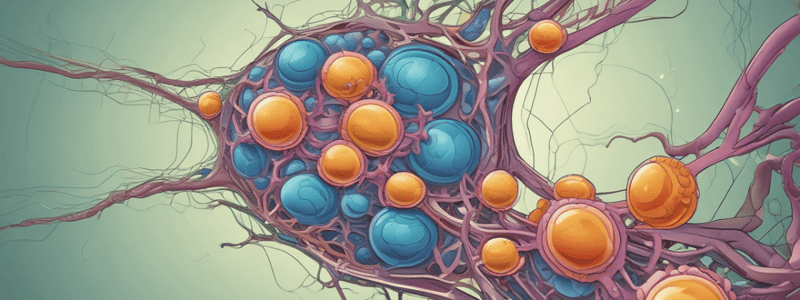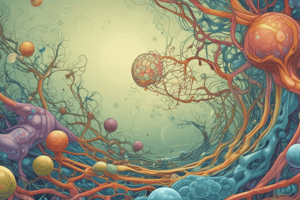Podcast
Questions and Answers
What type of transport involves the movement of molecules from high to low concentration without energy input?
What type of transport involves the movement of molecules from high to low concentration without energy input?
- Active Transport
- Cell Signaling
- Cell Adhesion
- Passive Transport (correct)
Which organelle is responsible for generating energy for the cell through cellular respiration?
Which organelle is responsible for generating energy for the cell through cellular respiration?
- Mitochondria (correct)
- Endoplasmic Reticulum
- Nucleus
- Lysosomes
What is the process of cell division resulting in four non-identical daughter cells?
What is the process of cell division resulting in four non-identical daughter cells?
- Metabolism
- Mitosis
- Cytokinesis
- Meiosis (correct)
What is the gel-like substance inside the cell where metabolic processes occur?
What is the gel-like substance inside the cell where metabolic processes occur?
What is the process of communication between cells through signaling molecules?
What is the process of communication between cells through signaling molecules?
What is the longest stage of the cell cycle, where the cell grows, replicates, and prepares for division?
What is the longest stage of the cell cycle, where the cell grows, replicates, and prepares for division?
Flashcards are hidden until you start studying
Study Notes
Cell Structure
- Plasma Membrane: a semi-permeable membrane that surrounds the cell, regulating what enters and leaves
- Cytoplasm: a gel-like substance inside the cell where metabolic processes occur
- Cytosol: a liquid component of cytoplasm where many metabolic reactions take place
- Organelles: specialized structures within the cell that perform specific functions
- Nucleus: contains genetic material (DNA)
- Mitochondria: generates energy for the cell through cellular respiration
- Endoplasmic Reticulum (ER): involved in protein synthesis, transport, and storage
- Lysosomes: contain digestive enzymes for breaking down and recycling cellular waste
- Golgi Apparatus: processes and modifies proteins and lipids for transport
Cell Functions
- Metabolism: the process of energy conversion and utilization
- Cell Division: the process of cell growth, replication, and division
- Mitosis: the process of cell division resulting in two identical daughter cells
- Meiosis: the process of cell division resulting in four non-identical daughter cells (gametes)
- Cell Signaling: the process of communication between cells through signaling molecules
- Cell Adhesion: the process of cells sticking together to form tissues
Cell Transport
- Passive Transport: movement of molecules from high to low concentration without energy input
- Diffusion: movement of molecules from high to low concentration
- Osmosis: movement of water molecules through a semi-permeable membrane
- Active Transport: movement of molecules against their concentration gradient using energy
- Carrier Proteins: transport molecules across the plasma membrane using energy
Cell Cycle
- Interphase: the longest stage of the cell cycle, where the cell grows, replicates, and prepares for division
- Mitotic Phase: the stage of the cell cycle where cell division occurs
- Cytokinesis: the physical process of cell division, resulting in two daughter cells
Studying That Suits You
Use AI to generate personalized quizzes and flashcards to suit your learning preferences.




